Create successful ePaper yourself
Turn your PDF publications into a flip-book with our unique Google optimized e-Paper software.
Land confiscation & forcedrelocation“The company came and simply took the land.” – LTJBy consolidating control over the jade industry, Burma’s military regime hasreaped significant profits at immense cost to the human rights and environmentalsecurity of the people living in Kachin State. The following section draws onseveral years experience of ASKYU working in jade mining areas as well as thirtyinterviews conducted by AKSYU between September 2007 and May 2008 withjade miners, jade traders, mining company employees, community leaders,drug users, and sex workers in Kachin State. To protect the security of theinterviewees, they are identified only by their initials. All original interviews remainon file with AKSYU.Since 2006, tens of villages and thousands of people have lost their homes and lands due to expandedjade mining. Companies working with the Burmese government are confiscating lands and forcing people torelocate. Ownership documents and agreements have proven useless in protecting against the onslaught andcompensation, if given at all, is drastically beneath the market price. Complaints and formal lawsuits alike havefound no redress.Entire villages have been ordered to move out to make way for mining operations, often without any indicationof where they should go. The encroaching mining operations have also made some areas so uninhabitable thatpeople have no choice but to flee. Strip mining and improper disposal of soil are causing landslides, erosion andunnatural flooding. These factors are also forcing people to relocate and causing environmental damage.Miners work in life-threatening conditions without protection; accidents and fatalities occur without record orcompensation. Miners that used to have a stake in smaller operations are now daily wage earners for companiesmaking less than US$1 per day. Those that cannot get a job with a company resort to being Yemase or stonecollectors who sift through dumped soil and tailings. They are hunted, beaten and killed by company security,sometimes hired Burmese Army soldiers, if found on “company property.”“I have followed ten law suits over land confiscation cases. All of the plaintiffs have official titles of ownership butthe government-affiliated companies zoned their land for mining. The owners asked for compensation, but thecompanies did not pay…and they can’t say anything against it.” – LTJ“In 2007, Sharaw Hka, Moziza and Kate villages had to relocate. Gwi Hka village has been moving since last yearand everyone has to be gone within this year. The entire village of Maw Mau Layang was also ordered to relocate.The government said they would show the people where to go, but still no notice has been given. The company isonly giving about 2-300,000 for a house that is worth 10 million.” - MYH and TL“In June 2007, my village of 800 households was forced to move. No one received any compensation. Aresettlement place was prepared but it was just on top of a heap of dumped soil and tailings from mining. We evenhad to pay 30,000 kyat for that terrible land.” - MYH“They confiscate farmland and forcibly relocate villages. Every year, we have to move from place toplace and build a new house – and we have to move more and more often. The explosions in the minesaffect our houses, and sometimes the explosions hit people’s homes and people are killed.” - SDY, jademerchant“The Kachin Baptist Church was taken. Under Burmese Law, churches and temples can not be confiscated. Butthey did it anyway - no matter what kind of place, it can be zoned for mining.” - LTJ“Our homes and gardens are being designated as mining zones and confiscated without compensation by thegovernment and its companies. Many parts of Hpakant now look like a garbage heap. The company mines allaround the homes until the area is destroyed. The authorities don’t even come and see the situation.” - LADisplaced village, forcibly relocated to the middle of a mineDrug abuse (including injection drug use) is notorious in jade mining areas; heroin, raw opium, methamphetaminesand various mixtures of drugs are widely available. Companies give out drugs to miners to encourage them towork longer while state authorities extort bribes and taxes from drug dealers, allowing the business to thrive. Thegovernment sells licenses to drug dealers and only takes action against those sellers who have not paid their dues.Local leaders trying to find the solution cannot close down drug centers because drug sellers merely pay bribes tothe government to stay open.The transient nature of mining communities coupled with limited job opportunities and low wages for womencultivates a sex industry in jade mining areas. “Sex centers”, or a room of 10-30 women working in small sectionscordoned off by curtains, are easy to find. Young women forced into such work by economic desperation find itdifficult to escape the situation. The sex industry together with injection drug use has been a recipe for an HIV/AIDSepidemic in Kachin State that has spilled over the border into China. HIV seroprevalence rates in injecting drugusers of 60-80 percent were recorded in the town of Ruili just opposite the Burmese border in the 1990s. Todayfour prefectures in Yunnan Province are regarded as having “generalized HIV epidemics.” 28


